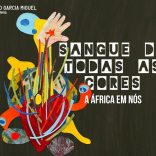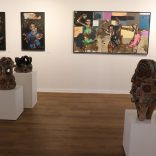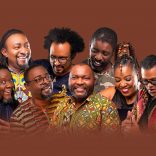Performers from Angola, Brazil and Mozambique bring poetry by Noémia de Sousa to the stage
Mozambique: First African woman writer to win Camões Prize ponders award, work

Photo: Lusa
Paulina Chiziane, the first female African writer to win the Camões Prize for Portuguese-language literature, continues to celebrate this award with her people, even those who cannot read, while saying that those “who think they are wiser” have yet to recover from the shock.
“A good part of those who think they are the most knowledgeable, the wisest, always looked at me with that doctor look, they on the pedestal and I always on the ground – I always liked to put my feet on the ground – and it was a surprise, a shock for some of them, but it was just as well, because I actually write in Portuguese,” she said in an interview with Lusa in Lisbon, where she is engaged in a series of activities centred on her work.
The author acknowledged that she never imagined there were so many people so interested in listening to her and reading what she wrote, and only regrets not being able to “embrace them all”: those who live in Africa, Portugal and Brazil, as well a sother countries where Portuguese is not spoken.
What surprised her most was “the celebration of the people” – even of those who can’t read – “because people have always looked at the Camões Prize as something very distant from Africans, especially black people”.
“I am the first person of black race, black Bantu, to receive the prize,” she said, recounting that “people have always looked at this prize with a distance” as “the prize of others”. The winner this time, she stressed, “is not a white person, it’s going to be a mulatto, but black and on top of that a woman.”
This would be a shock, she said, to “those tough guys who think they are the owners of the Portuguese language and the owners of wisdom.”
Chiziane explained that although she studied Portuguese, as her second language, she belongs to a Bantu culture.
“It is logical that the structure of the Portuguese language that I speak will be a mixture of two cultures,” she said. “And I always defended this and many times the purists of the language, Mozambicans, blacks, academics and some thought that a good Portuguese language has to be spoken, even in Portuguese.
“And I would say: easy there! And where is the structure of my Bantu language?” she asked rhetorically. “The Bantu aesthetic, where does that leave us? I’m not going to throw away my heritage.
“I am the product of the Bantu culture and I am the product of this culture that came with Europe and imposed itself on my land,” she went on. “The Portuguese language is mine and I shall use it as I wish.
“The Portuguese language, which has its origins in Europe and which brings with it the culture of Europe” is also in Africa, where “it was imposed”, she noted. “We accept it because it is a very useful and important instrument, but this language does not penetrate so well into our world. That is, we can communicate, but there are some [other] aspects of our essence, our fauna, our flora and our seas.”
The writer said that that “the great criticism that is made of African writers, in the Portuguese language or not, is that Africans do not know how to name the flowers, they only say the flowers; they do not know how to name the birds, because they only say the birds [and] the little birds” but that this as because Mozambique’s tropical flora is different from that of Europe: “Each language, each culture, knows how to name its flowers and its plants.
“Sometimes I say: we, as Mozambicans or Africans in general, have a very good thing, we have our mother tongues and then we learn Portuguese to communicate with others; then we learn French, English to work,” she recalled. “We end up becoming polyglots.”
In other words, “Africans, in terms of languages, have a heritage that is sometimes greater than that of Portugal or Europe, because almost every African is obliged to know more than one language.”
On the next themes of her work, Chiziane promised to insist on what she likes most: life and existence.
“I think that we, as human beings, are out of touch with our own humanity,” she said, giving herself as an example. “I am African, but I am distant from Africa, even though I am living in Africa; it is as if I was forbidden or was forbidden by some law to be Afrian. I was born in a time when I couldn’t speak my own language.
“I’m living in a society that looks at Africa as this place, I don’t know, of hell or non-existent,” she went on. “I am living in a world where an African cannot express his religiosity and is sometimes ashamed of his own race, his hair and the way he is. This is the world that we have inherited from these conflicts and these pyramids that the world believes it must build to classify human beings.”
As a result, she said, “from time to time” she feels “an urge to contribute to a reflection on all this and try to understand the reasons why the world is so unbalanced.”













Leave a Reply
Be the First to Comment!
You must be logged in to post a comment.
You must be logged in to post a comment.